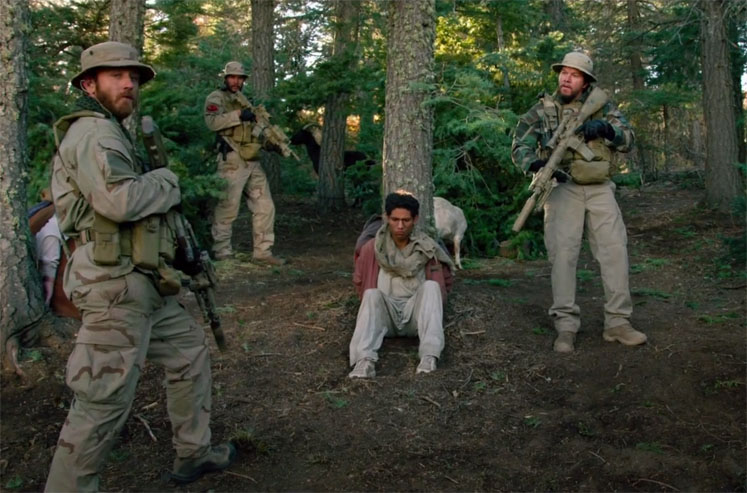What is the point of a movie like Lone Survivor? Peter Berg’s new film is obsessively a tale of bravery, heroism, and sacrifice. It opens with a montage of real life Navy Seal training, documenting the extreme endurance, physical prowess, and ability to withstand immense pressure that is required to become one of the United States’ most highly-trained and capable soldiers. It tells us what we are about to see is based on real events, and then it recreates the failed mission in Afghanistan in 2005 which saw 19 U.S. soldiers die. All of it is recreated not so much in the excruciating realism of battle, but with the voyeuristic flair of a violent video game. It then executes its American characters one-by-one in stylized death sequences which read like ritualistic sacrifices, primal bloodlust underscoring patriotic fervor. It’s obscene, grotesque, manipulative, and pornographic, and it is driven by the same jingoistic misinterpretation of what it means to “support the troops” that is criticized in recent books like David Finkel’s Thank You for Your Service and Andrew Bacevich’s Breach of Trust: How Americans Failed Their Soldiers. In Lone Survivor, the horrors of war are fetishized and aestheticized into a kind of gym-body propaganda that will pack seats in suburban movieplexes.
The truth is most of the brave American men who died in the Afghanistan mountains in August 2005 didn’t go down in a blaze of glory, like G.I. Joe cartoons. Most died because of the fog of war, bad communication and decision making that ended up with two defenseless helicopters flying low over a mountain top where Taliban fighters could pick them off with RPGs. Most died needlessly, gratuitously, tragically and depressingly “unheroic” deaths. Certainly they deserved more than that, but they also deserve more than a film like Lone Survivor, which tries to find meaning in their death by transforming them into gladiators, a movie that confuses mourning with pandering for a flabbergasted, reflexive emotional shock.
There is some high tension, as the soldiers threw themselves down cliffs, take bullets, and try to fight their way out of an impossible situation. But much of the film plays like a better-crafted Rambo, with the contemporary penchant for immersive, docu-shaky camera work. Despite this attempt to bring us into the horrible intimacy of the interior of violence, the film creates a dynamic that distances and dehumanizes the other. The Americans are clearly the over-matched victims of this skirmish, but there is still something unsettling about the gratuitous glee the film takes as Taliban are mowed down like faceless, disposable vermin.
One of the best films ever made about war continues to be Michael Cimino’s The Deer Hunter. What is striking about The Deer Hunter is how few scenes of actual combat there actually are, and even those combat scenes are of only secondary importance to the film’s dramatic core. Instead, what Cimino understood is that you don’t make a movie about war and about soldiers by showing actual combat. Combat is too meaningless and abstract, and cinema too essentially voyeuristic an art form to represent battle in a way that doesn’t register as sport. Instead, the reality of war can only be captured by registering the psychic firefights that rage in the souls of its practitioners.
If “Support the Troops” means anything, than more than a decade after American soldiers entered Baghdad, those troops deserve a film that tries to locate their heroics and bravery within the chaos of war’s ordeal. But when a film that truly takes stock of the full measure of that bravery, sacrifice, and dignity is finally made, it will look nothing like Lone Survivor.






